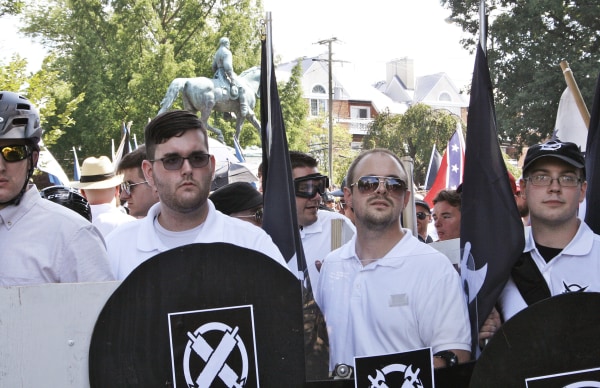These [white supremacist] groups seem to believe they have a friend in Donald Trump in the White House. I don't know why they believe that, but they don't see me as a friend in the Senate, and I would urge the president to dissuade these groups that he's their friend.
- Senator Lindsey Graham,
Fox News Sunday, 8-13-2017
This week's featured post is "The Battles Within the White House are Even Crazier Than You Think". I'm still intending to get back to the "Misunderstandings" series, if the immediate news developments ever slow down.
This last couple of days everybody has talking about Charlottesville
Charlottesville is where Thomas Jefferson put the University of Virginia. Like most university towns, it's solidly blue: Clinton beat Trump 80%-13%. Like a lot of liberal areas in the South, it's been wondering why it has all these monuments to the Confederacy. Sure, the Confederacy ought to be remembered, but does it really deserve to be celebrated?
In particular, a huge statue of Robert E. Lee on a horse was erected there in 1924. In April, the City Council voted to remove the statue, but there's a court case based on a 1902 state law protecting war monuments, so it's not clear what will happen.
This weekend, an alliance of alt-Right groups (including the KKK and some neo-Nazis), converged on Charlottesville for a "Unite the Right" rally centered on the Lee statue. Many came armed and in military-style riot gear, or waved Confederate or Nazi flags. Friday night there was a torchlight march, reminiscent of the torchlight parades of the Third Reich.
It wasn't the first time: White supremacist Richard Spencer led a torchlight protest in support of the statue back in May. The KKK had rallied at a different Charlottesville park in early July.
Counter-protesters, many of them clergy, also converged on Charlottesville. (I'm not clergy, but I'm on some of the same mailing lists as Unitarian ministers. I got a request to come to Charlottesville for the counter-protest. It did not say anything about coming armed or in riot gear.) Reportedly, there were also some anti-fascist counter-protesters (not clear how many), who believe in meeting violence with violence.
Friday night, the right-wingers marched through the university campus chanting "white lives matter" and other white supremacist slogans, including some anti-Semitic ones. Counter-protesters had gathered around a Jefferson statue; they were encircled by the marchers and some scuffling occurred, apparently with only minor injuries.
Saturday, the violence peaked with a reported Nazi sympathizer ramming his car into a crowd of protesters, killing one and injuring 19. The photo below shows the alleged driver carrying a shield with the Lee statue in the background. (He's just below the horse's tail.)

Piece of advice these next few days: Don't get trolled. Some truly awful links are going around on social media, including a number to articles that I think were written purely to outrage people like me (and, I assume, you). By linking to them, we publicize the web sites they come from, which I think was the point.
You who know who really deserve to be on Southern Civil War monuments? Slaves who escaped, joined the Union Army, and came back to fight for the freedom of their people. Those are the real Southern heroes.
Some previous Sift articles: "You Don't Have to Hate Anybody to be a Bigot", "Please Take Down Your Confederate Flag", and "Not a Tea Party, a Confederate Party".
and Trump's lack of response

The President responded to this act of right-wing terrorism by listlessly reading a statement that refused to take sides between Nazis and people who protest against Nazis.
We condemn in the strongest possible terms this egregious display of hatred, bigotry and violence, on many sides, on many sides.
He continued with boilerplate rhetoric about "restoring law and order" and urging everyone to "come together as Americans with love for our nation", before complaining that this violence was taking him off message.
Our country is doing very well in so many ways. We have record, just absolute record, employment. We have unemployment the lowest it's been in almost 17 years. We have companies pouring into our country, Foxconn and car companies and so many others. They're coming back to our country. We're renegotiating trade deals to make them great for our country and great for the American worker. We have so many incredible things happening in our country, so when I watch Charlottesville, to me it's very, very sad.
Because it doesn't matter who's dead, everything is about him and his accomplishments. And once again he talked as if his base were the whole of America.
We are all Americans first. We love our country. We love our God. We love our flag. We're proud of our country. We're proud of who we are.
So if you feel mistreated by America, don't believe in God, have mixed feelings about the flag, or if recent events -- including the very event he's supposed to be responding to -- sometimes make you feel ashamed of your country, then he's not even trying to be your president. You're not part of the "all" he's speaking for.
You only had to look at other Republicans to realize that getting this right is not difficult. Orrin Hatch tweeted:
We should call evil by its name. My brother didn't give his life fighting Hitler for Nazi ideas to go unchallenged here at home.
Ted Effing Cruz, for God's sake, wrote:
The Nazis, the KKK, and white supremacists are repulsive and evil, and all of us have a moral obligation to speak out against the lies, bigotry, anti-Semitism, and hatred that they propagate.
How hard was that? But even after nearly two days, nothing from the President against white supremacy and Nazism.
Here's what it comes down to. KKK types like David Duke are invoking Trump's name and telling their followers that Trump is on their side. Trump is not telling them that they're wrong, because they're not wrong. He and his administration have been cultivating white supremacist support for years. He won't criticize them because they're his base.
Trump also has said nothing about the bombing of a mosque in Minnesota more than a week ago. His spokesman Sebastian Gorka said Trump would comment "when we have some kind of finalized investigation", but not before, because "people fake hate crimes ... with some regularity".
Gorka, Stephen Miller, Steve Bannon -- the alt-Right recognizes them as their own people inside the Trump administration.
Another place where Trump is slow to speak out is against Vladimir Putin. Putin responded to the new sanctions Congress just passed (by a near-unanimous margin that caused Trump to sign the bill rather than face a veto override) by demanding large cuts in the U.S. diplomatic mission to Russia. When asked about it by a reporter on Thursday, he thanked Putin for helping him trim the payroll.
He later claimed he was being "sarcastic". But whether he was serious or not, he clearly avoided criticizing or opposing Putin, who seems to be the alpha in their relationship.
but before that it looked like we might go to war with North Korea

It's starting to look like we might not go to war after all, though it's hard to say that anything has changed in the last few days. And as Rachel Maddow keeps pointing out, it's also not clear what changed before that to ratchet up the tensions.
Over-simplifying recent history into one paragraph: The Clinton administration recognized that we had no good military options against North Korea, so instead it bribed the Kim dynasty with aid in exchange for it not developing nuclear weapons. Then the Bush administration came in and decided to "get tough" and end Clinton's "appeasement". So the Clinton deal collapsed, and Bush got to posture in a manly fashion. But there were still no good "tough" options, so North Korea developed nuclear weapons. That's how we got into this situation.
Josh Marshall concludes:
The real lesson I draw from this is that we should be extremely wary about actions which have the feeling or appearance of toughness but which are likely to have negative or even dire results because we have no viable, alternative policy. That seems very much like the situation we are moving toward with North Korea. Certainly it’s what President Trump was doing yesterday when he made wild threats he is highly, highly unlikely to follow through on.
Back in May, Stephen Krasner wrote "A Least Worst Option on North Korea", which I recommend. His conclusions:
- All-out war would mean the destruction of Seoul (and possibly Tokyo, though Krasner doesn't say so), so it's not acceptable. "If South Korea suffered such a large loss of life as a result of a basically unilateral American strike, it would be the end not only of the South Korean-U.S. alliance but of NATO as well. No country will tie itself to the United States if the United States through its own actions can take measures that would result in hundreds of thousands of citizens in other countries being killed."
- Only China has enough influence in North Korea to bring about new leadership with less destabilizing policies.
- Our best-case outcome is China's worst-case outcome: a unified Korea allied with the United States. We can't hope for Chinese help that makes such an outcome more likely.
His proposal:
So there is a deal that the United States could credibly offer to China: leadership change in North Korea and the end to nuclear and missile programs there, in exchange for the withdrawal of American troops from the peninsula. All U.S. forces would be removed, if China actually succeeded in engineering the ouster of Kim Jung-un and an associated end to its nuclear and missile programs. A North Korean commitment to end its nuclear program made by a leader dependent on China would be more credible than any commitment made by Kim.
China is trying to be the grown-up in the room. In contrast to Kim's usual over-the-top rhetoric and Trump's off-the-cuff threats, Thursday a Chinese state-owned newspaper published a carefully worded editorial that Western observers regard as a "semi-official" statement from the government.
China should also make clear that if North Korea launches missiles that threaten US soil first and the US retaliates, China will stay neutral. If the US and South Korea carry out strikes and try to overthrow the North Korean regime and change the political pattern of the Korean Peninsula, China will prevent them from doing so.
I imagine this being said in the tone of voice of a Mom drawing a line down the center of the back seat and insisting that the kids each stay on their own side.
and that Google anti-diversity memo
In case you didn't hear about it: Google engineer James Damore posted a memo to one of Google's internal discussion lists, criticizing Google's program to promote race-and-gender diversity in the workforce and management. The two final bullet points in his introduction were:
- Differences in distributions of traits between men and women may in part explain why we don't have 50% representation of women in tech and leadership.
- Discrimination to reach equal representation is unfair, divisive, and bad for business.
The memo got out and went viral. Google fired him. This also sparked a huge amount of discussion, and the engineer is on his way to becoming an alt-Right hero. I wouldn't be surprised if he gets a book-and-movie deal out of it.
Rather than write my own article about these issues, I think I'll just say a few things briefly and then point you at the commentary I found most thoughtful.
My few things:
- There probably are "differences in distributions of traits" between men and women that might continue to be present in a totally non-sexist world. But society as we know it -- and the tech workplace in particular -- is such a contaminated environment that I don't know how you'd do convincing research to measure how significant those differences are.
- There is a long, sad history of science being used to bolster social stereotypes. To borrow a legal term, any conclusions along those lines deserve strict scrutiny.
- If there is some "natural" level of women in tech -- the number you'd get if there were neither sexism nor diversity programs to counter it -- I'll bet it's higher than Google's current 20-25%. Talking about 50% is a red herring; there are more possibilities than (1) perfect equality and (2) the status quo.
- Job descriptions and the population of people who hold those jobs evolve together. Our current understanding of what it means to be a software engineer was shaped during an era when it was a job for men, so it may well depend on certain stereotypically male traits that aren't actually necessary. If the job as currently defined is "unnatural" for women, that could be a reason to change the job.
Now let's get to other people's comments. The best zinger I heard was tweeted by Sarcastic Rover, the alleged voice of the AI governing the NASA Mars rover.
Some people just love a merit-based system… right up until the merit you want is “not being an asshole.”
If you want to argue the science with Damore, start here.
Claire Cain Miller writes on NYT's "The Upshot" blog that stereotypic male nerdiness is not necessarily what software engineering is about.
Technical skills without empathy have resulted in products that have bombed in the market, because a vital step to building a product is the ability to imagine how someone else might think and feel. “The failure rate in software development is enormous, but it almost never means the code doesn’t work,” Mr. Ensmenger said. “It doesn’t solve the problem that actually exists, or it imagines a user completely different from actual users.”
Ezra Klein went meta, thinking about the reasons this incident hit such a nerve with the larger public.
Behind the furor over the memo is our unease with the unaccountable, opaque power Google in particular, and Silicon Valley in general, wields over our lives. If Google — and the tech world more generally — is sexist, or in the grips of a totalitarian cult of political correctness, or a secret hotbed of alt-right reactionaries, the consequences would be profound.
Google's influence is much harder to avoid than McDonalds' or WalMart's.
Compounding the problem is that the tech industry’s point of view is embedded deep in the product, not announced on the packaging. Its biases are quietly built into algorithms, reflected in platform rules, expressed in code few of us can understand and fewer of us will ever read. And yet those hidden commands and unexamined choices can lead to discrimination in housing and jobs, to a public sphere that fosters continual harassment of women and people of color, to a world where conservative news is suppressed, to a digital commons that everyone must use but that only a certain kind of person gets to build.
... The technology industry’s power is vast, and the way that power is expressed is opaque, so the only real assurance you can have that your interests and needs are being considered is to be in the room when the decisions are made and the code is written. But tech as an industry is unrepresentative of the people it serves and unaccountable in the way it serves them, and so there’s very little confidence among any group that the people in the room are the right ones.
So long as that’s true, any indication that the builders of tomorrow are quietly against you, which is what Damore’s memo was, will be explosive.
and you also might be interested in ...
Early in the week I thought I might have space to talk about final draft of the "Climate Science Special Report" of the U.S. Global Change Research Program. Key quote:
It is extremely likely that human influence has been the dominant cause of the observed warming since the mid-20th century. For the warming over the last century, there is no convincing alternative explanation supported by the extent of the observational evidence.
Amy McGrath made a big splash with the opening video of her campaign for the congressional seat in Kentucky's 6th district. The district has more registered Democrats than Republicans, but has been held by Republican Andy Barr since 2012. Barr got 61% of the vote in 2016.
CNN does its best to make sense of Trump's attacks on Majority Leader Mitch McConnell.
Attacking McConnell over Senate inaction also allows Trump to cultivate the two crucial sectors of his political support at the same time -- his loyal base of less ideological voters who hate the establishment, and purist conservatives who are livid that Obamacare remains the law of the land.
But not even Newt Gingrich is on board with Trump here.
One constant of Trump's character is that nothing is ever his fault. Very little that he promised during the campaign is actually getting done, so he needs a scapegoat. But this much should be obvious: If Trump had offered the healthcare plan he promised -- the one that gave everybody better coverage for less money, and was less expensive for the government too -- it would have zoomed through Congress. The fact that he was lying and actually had no plan at all is his own fault, not McConnell's.
From The Weekly Standard, which is one of the flagship publications of the conservative media:
Short-lived White House communications director Anthony Scaramucci was an utterly forgettable political hack. But he said one thing before he was dismissed that’s worth reflecting on: “There are people inside the administration that think it is their job to save America from this president. Okay?” Scaramucci was right about that. We know these people, and we admire them. We wish them every success.
Taylor Swift's $1 countersuit against the guy who's suing her for millions (because her complaint of sexual harassment, he claims, got him fired) could be a teaching moment for the larger society. Being famous, beautiful, well-known, rich, and so forth, Swift has advantages that most harassed women lack. So at the same time that it's instructive and satisfying to watch the usual attacks fail to throw her off-stride, the trial also has to give you sympathy for the women who usually have to face these tactics.
538 puts data behind the case I was making last week: Colin Kaepernick deserves to have a job in the NFL.
Two white women in Washington state have started White Nonsense Roundup.
If you are a Person of Color (POC), you have enough on your plate! It’s not your job to educate white people about privilege, racism, and what’s really going on in the world. If a white person is filling your social media with white nonsense – anything from overt racism to well-intentioned problematic statements – tag us and a white person will come roundup our own.
and let's close with something brilliant
By now readers know that I love song parodies and Game of Thrones. So how could I resist "Westerosi Rhapsody"?
Be warned: The video is not safe for work, contains graphic sex and violence, and includes spoilers for most of the major plot developments through Season 6.
 Who are you kidding? You're all about small government until you get stuck in a tree.[/caption]
Who are you kidding? You're all about small government until you get stuck in a tree.[/caption]











